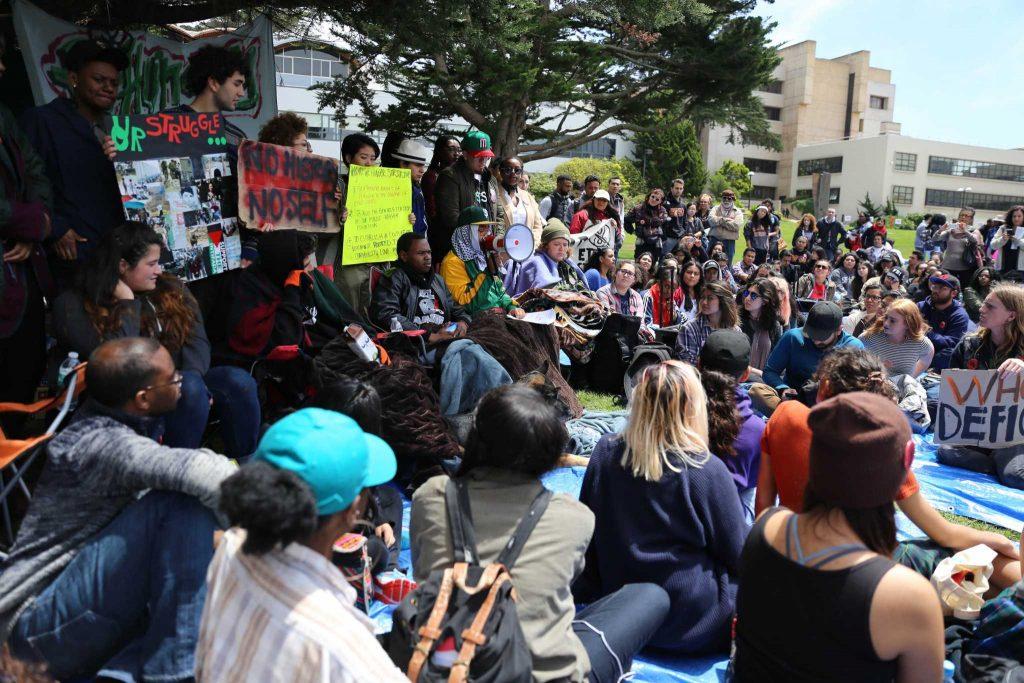President Leslie E. Wong surfaced for a press conference Monday behind closed doors in the Administration Building, expressing concern for the hunger strikers’ health and his commitment to creating “an open and deliberate process” to address the issues within the College of Ethnic Studies.
He said the protesters’ list of 10 demands actually parse out to 26, which he plans to discuss and negotiate.
Wong said the demand of $8 million for the College of Ethnic Studies was not “unrealistic” but noted it would be “a difficult task.”
When asked if that task was impossible, Wong said, “Impossible? I would hope Daddy Warbucks would fall out of the sky and offer us a huge gift. But life in a CSU in California, I think is a series of intelligent compromises. And that’s all I can say at this point in time.”
College of Ethnic Studies faculty sent a letter to CSU Chancellor Timothy P. White calling for a civil rights and racial discrimination investigation at SF State. According to a press release from American Indian Studies Chair Andrew Jolivette, the chancellor will respond by May 23.
“The chancellor has taken up their request quite seriously,” Wong said. “I tend to see it as a very serious review of a number of issues from process as well as to specific cases. I don’t want to substitute the words they used, but I saw a much larger context to it.”
Monday, May 2, four students who call themselves the Third World Liberation Front 2016 began a hunger strike to draw administration attention. On their eighth day sans solid food, the San Francisco community came together for an on-campus press conference an hour prior to Wong’s press conference, featuring speeches by activists, including actor and SF State alumnus Danny Glover and San Francisco Supervisor Eric Mar.
“I was so moved by what is happening here and what has happened historically to this program,” Glover said to the crowd. “There’s an attempt to undermine this program, an attempt to undermine and de-radicalize universities around the country. …We’re here to change the narrative.”
Mar said San Francisco Supervisors David Campos, John Avalos and Jane Kim support the “courageous” strikers and their “just” list of demands.
“I worry about the health of the strikers here and the strikers that are in front of City Hall,” Mar said. “But I also know that the College of Ethnic Studies has been starved. It’s a systemic starvation.”
At the campus press conference, supporters challenged Wong, who was not in attendance, to take a course in ethnic studies.
“I used to teach ethnic studies,” Wong said, noting that he would still be happy to take one hypothetically. “For my schedule, I might get flunked because I wouldn’t be able to make class all the time.”
After the conferences Monday, 19-year-old hunger striker Julia Retzlaff was rushed to the hospital. She returned to the strike campsite in the quad after treatment. Retzlaff said she plans to continue the strike.
Tuesday, Wong released a statement to the SF State community reiterating this commitment and urging the Third World Liberation Front 2016 to call off their strike. He has scheduled a meeting with the strikers’ negotiating team May 11 at 8 a.m.
“I am also writing to request that the students take my commitment to come to the negotiating table in good faith and end their hunger strike immediately,” he wrote. “I believe, together, we can come to a resolution that ensures that the College of Ethnic Studies thrives in perpetuity.”
SF State has been riddled with strife this semester, with all eyes fixed on the College of Ethnic Studies.
Between December 2007 and June 2009, California fell into fiscal crisis, sending ripples through the state’s education system. The California State University felt the blow and SF State administration made cuts to each of its colleges.

“I got here in 2012 and inherited a pretty substantial underfunded situation,” Wong said. “Students have some legitimate concerns about bottlenecks, availability of courses. All six colleges as well as student affairs have been, I think, underfunded for quite some time.”
While other universities offer ethnic studies departments, SF State is the only school in the U.S. to have a college dedicated to ethnic studies. The College was founded in 1969 in response to campus-wide protests in 1968-69.
According to the most recent data from SF State’s 2015 Data Book, 232 students were enrolled in the College of Ethnic Studies in Fall 2014, comprising .8 percent of the University. The College of Liberal and Creative Arts was home to 26 percent of the student population, with 7,652 students enrolled Fall 2014.
In February 2016, a discussion occurred between University administration and College of Ethnic Studies faculty surrounding budgetary concerns specific to Ethnic Studies, which includes Africana studies, American Indian studies, Asian American studies, Latina/Latino studies and race and resistance studies.
Supporters of the College of Ethnic Studies allege that cuts were disproportionate and funds were not appropriately restored, preventing the College from providing adequate resources and hiring replacement lecturers and tenure-track faculty. The Ethnic Studies Student Organization released a list of 10 demands on Feb. 25, amid related campus rallies and protests.
Supporters felt administration was dodging the issue and their demands. Focus has centered around a budget totaling $8 million, which accounts for inflation since 2007.
By way of social media, word spread quickly and statements of solidarity from universities and individuals across the globe began to flood in. Affirmations came from Harvard, Stanford, UC Davis, North Carolina and Sweden, among others – a full list can be seen on the Defend and Advance Ethnic Studies at SF State Facebook page.





